
No, it doesn't, other than the fact that it's such a big deal to so many people. So why bother? Well, spectator sports fascinate many people, even though they are so inconsequential; so please forgive me if I waste effort on this question. Consider it a hobby of mine.
Let me say here that I am not a scientist, nor a theologist, nor a philosopher. My education of these matters has many holes. While I believe that everything I express here has been stated before, I'd be hard pressed to come-up with specific references.
Could humans experience a non existent God?
I am going to use 2 analogies to show how it's possible that
a) God (as normally defined) doesn't exist, and
b) humans experience God and talk as if it existed.
The first analogy is a well known optical illusion. Take two identical lines:

Their length can be made to look different by adding arrow ends:

We know that the lines are equally long, but we feel that the top one is longer. We recognize that our brain is fooled into thinking that the top line is longer, even though we rationally know they are both the same, and we are simply amused by that fact.
Similarly, you may know that there is no God, and yet experience it. You could decide that your brain is fooled into thinking that there is such as thing as "God", even though you rationally know there's no such thing, and be simply amused by that fact.
The second analogy is the expedient of stating that the sun raises from the East and sets in the West. We know that the earth is not flat, and we know that it rotates around the Sun. Yet. we don't think twice about the terms "sunrise" and "sunset". These expressions are left over from a simpler time when people didn't understand astronomy. We keep on using these expressions because are very ingrained in our culture; and if we came-up with physically accurate expressions, they would be a mouthful.
Similarly, if one day we were to prove that there's no God, we'd still use the word "God" as an interlocution ("God you look good!") and as a Creator ("God's creatures"). These expressions will remain from this simpler time when people don't understand the true nature of God. We'll keep on using these expressions because they will remain ingrained in our culture, and because physically accurate expressions will be too complex to use in everyday language.
So, the possible absence of God doesn't preclude us from experiencing it. And God would remain in our culture even if its existence were disproved.
So far, I didn't disprove the existence of God. I simply showed that it's possible that God doesn't exist, despite our experiences and our culture. Now, I will state a theory that would allow the non-existence of God yet explain how humans experience God.
Yes! No!
Of course, it depends on the definition of God.
Here I use 2 definitions:
1) The "Biological God", as a phenomenon of the human
brain.
2) The "Cultural God", as a creation of human society.
Yes, the Biological God exists.
No, the Cultural God doesn't exist per se.
A person isolated from society from birth may still experience the Biological God, but would either not have a Cultural God, or would create his/her own version of it from scratch.
Now I will outline a theory that could explain our experiences
of God, and yet allow for its non-existence. This theory is (yet)
unprovable, but so is the existence of God. Of course, many more
theories have been and will be proposed.
My wish is to give Agnostics an alternative to the views presented
by religions, and let him/her apply Occam's razor ("the simplest
theory that fits the facts of a problem is the one that should
be selected").
Love, anguish, serenity, hate, intuition, conscious, self, and many other phenomena of the human brain are accepted as just that. Yet Humans aren't able to accept God as simply one more phenomenon of the human brain: the experience of God, and the need for a ultimate figure who gives meaning to our lives, are just that strong.
Why does the Biological God exist?
The Biological God developed in the human brain at the same time
as Reason did.
Mutations resulted in both phenomena. In a very simplistic view,
assume that these resulted in beings will all 4 permutations of
these mutations.
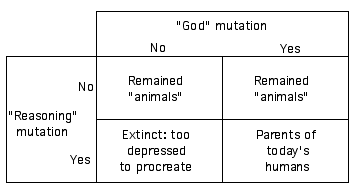
The beings that gained reasoning invented the concept of "meaning"
and started to ask "Why are we here? What's the meaning of
life?" (these are two of the so called "existential
questions"). Of those, the ones who realized that there is
no "meaning" to life, lacked the motivation to live
and procreate. On the other side, those who also developed the
concept of God, created answers to the existential questions,
and, satisfied, proceed to live and procreate. Their progeny retained
both mutations, and today's humans are both smart and experience
God.
Another way of looking at this is that God led to religion and
morality; and that those led to social order; and that social
order gave humans the stability they needed to survive and procreate.
That social order balanced the individualism and freedom that
reason gave humans. A tribe that evolved with too much reason
and not enough religion would have self-destructed and become
extinct.
The point is not "why do humans experience God". That
is, don't ask why humans both have reasoning and believe in God,
while other Primates don't (we assume).
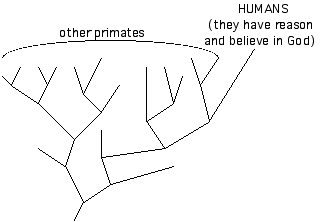
Instead, understand that if there hadn't been a mutation in certain humans to counteract the logical consequence of reasoning alone, there would be no humans today to ask the question "is there a God?". It is just by chance that those mutations occurred, and that they occurred in such a way to make humans what they are now. There were far many more Primates that didn't develop reasoning (to the extent that Humans have), and some of them still remain today. And there were far many more mutations that did result in reasoning, but not the biological God, and those beings became extinct because they didn't have reason to exist and procreate.
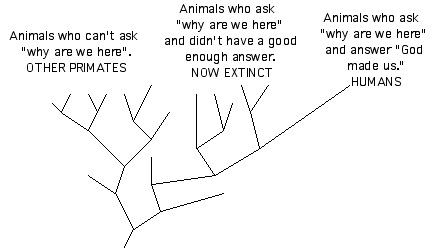
The chance of humans developing both reasoning and the biological God are vanishingly small, so this appears very unlikely (let's say, a 0.0000000001 % probability). But look at it the other way: if those mutations hadn't occurred, and in exactly that way, we wouldn't be here today asking those questions!
Those mutations did occur (that's a 100 % probability), and
here we are, asking these questions.
Had there been other sets of mutations, such that other, quite
different sentient beings had resulted (also with a vanishingly
small probability), they might now be asking what the chances
would be for evolution to result in beings exactly like them.
But those mutations would have occurred (that's a 100 % probability),
and here they would be, wandering what the chances were that they
would have developed.
Humans created the Cultural God because of their experience of the Biological God, and due to their need to provide default answers when reason can't.
We already explored the Biological God. Let's explore the "Default God".
As Reason answers more and more questions, people need God less and less as a default explanation of the unexplained. This would imply that the portion of questions answered by Reason (science) is asymptotically approaching 100 %. Form this, one could predict that one day the Default God will no longer be needed.
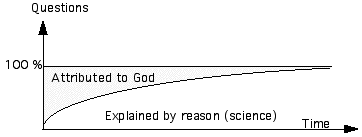
However, the unexplained questions increase as more questions are answered, so it is not clear that Reason will one day explain everything that is presently attributed to God.
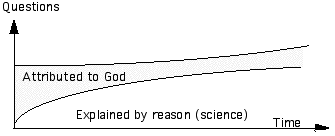
So, we said that the experiential God is a biological phenomenon, and that we may predict that the external God as a default explanation for the unexplainable may one day become unnecessary. All this could be stretched into a proof of the nonexistence of the Cultural God.
Even if Humans disproved the existence of the Cultural God, culture has such a momentum that eradicating God purely on rational grounds will be nearly impossible.
Roughly speaking, the human brain developed the Biological God soon after it started developing reasoning, to keep up with reasoning as it started asking existential questions. Unable to explain the experience of the Biological God, humans attributed the phenomenon to external forces, and created the Cultural God.
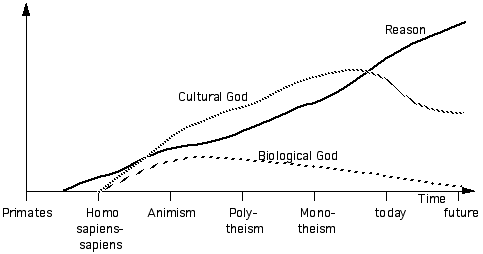
In the future, reason will be enhanced, while spirituality will be much reduced, though not eliminated. As the Biological God has had less and less effect compared to the juggernaut of organized religion, mutations that reduced the Biological God have not been eliminated by evolution, so, in general, the phenomenon of the Biological God has decreased over the centuries.
Humans developed Animism first, in which humans projected the biological God externally, onto objects and forces in nature. Then came Polytheism, which projected the biological God externally, onto an imaginary Pantheon ("All the Gods"). Finally, humans simplified the Pantheon into a single Omnipotent, Omniscient, Creator.
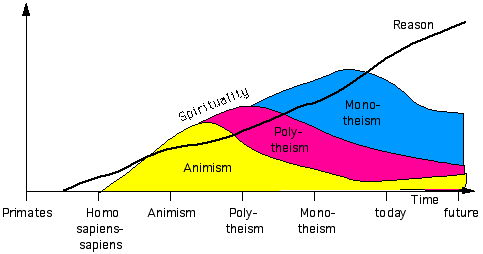
While developing new forms of the cultural God, humans retained the old forms. Today Animism is still present in Africa and is on the rise with "New Age" beliefs; Polytheism is still strong in Asian cultures (such as Hindu); while Monotheism continues to make inroads thanks to world imperialists who tend to be followers of the Abramic religions (Jewish, Christian, Moslem).
Morality as a socially stabilizing force
For a long time, reason has been overpowered by spirituality, stifling research and discovery. Today, reason has been freed from the bounds of spirituality, which on one side has allowed humans to greatly expand its understanding of the world, but on the other side has weakened social morality. That morality may be based on unreasonable, unfair and arbitrary rules, but it has given society an effective constraint to a damaging free-for-all. Humans now need to develop a different self regulating force, based on reason instead of tradition and spirituality, to replace the moral code, if they want to continue functioning as a society.
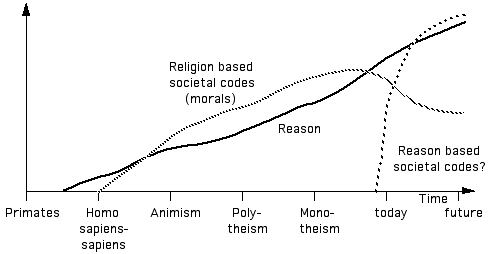
No.
Even if the existence of the Cultural God is disproved, it should
be purely for scientific (philosophical) reasons. In that case,
the absence of a Cultural God (and the existence of a biological
God) should be taught in school, but not in antithesis of spirituality.
The dichotomy between Science (reason) and Spirituality (Religion,
Astrology, Superstition...) is a false one. These are not at opposite
ends of the same axis,
but are instead orthogonal, and therefore independent. One can be as little or a much spiritual as one wants, regardless of how little or how much one uses reason.

Spirituality is what makes humans what they are, and is consistent with what humans experience. Spirituality answers existential questions and in so doing gives humans a reason to continue living. (Here I neatly bypass the philosophical question: "Should we strive for the continuation of the human race, or is it OK for it to become extinct?".)
It is possible that further evolution may give the human race
a reason to continue existing, either by eliminating existential
questions, or by finding a more compelling answer to them. Until
then, humans will ask existential questions, and spirituality
will answers them neatly. If we assume that the human race, as
presently developed, must remain on Earth, spirituality must remain
for at least a while longer, to justify the human race's existence
and regulate its society.